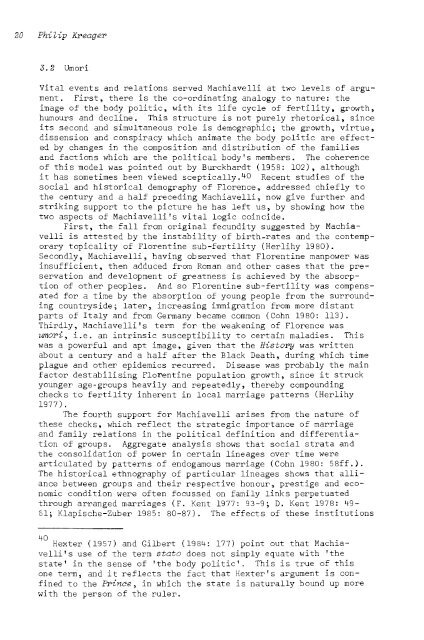CONTENTS NO.I - Institute of Social and Cultural Anthropology ...
CONTENTS NO.I - Institute of Social and Cultural Anthropology ...
CONTENTS NO.I - Institute of Social and Cultural Anthropology ...
Create successful ePaper yourself
Turn your PDF publications into a flip-book with our unique Google optimized e-Paper software.
20 Phi Zip Kreager<br />
3.2 Umori<br />
Vital events <strong>and</strong> relations served Machiavelli at two levels <strong>of</strong> argument.<br />
First, there is the co-ordinating analogy to nature: the<br />
image <strong>of</strong> the body politic, with its life cycle <strong>of</strong> fertility, growth,<br />
humours <strong>and</strong> decline. This structure is not purely rhetorical, since<br />
its second <strong>and</strong> simultaneous role is demographic; the growth, virtue,<br />
dissension <strong>and</strong> conspiracy which animate the body politic are effected<br />
by changes in the composition <strong>and</strong> distribution <strong>of</strong> the families<br />
<strong>and</strong> factions which are the body's members. The coherence<br />
<strong>of</strong> this model was pointed out by Burckhardt (1958: 102), although<br />
it has sometimes been viewed sceptically.40 Recent studies <strong>of</strong> the<br />
social <strong>and</strong> historical demography <strong>of</strong> Florence, addressed chiefly to<br />
the century <strong>and</strong> a half preceding Machiavelli, now give further <strong>and</strong><br />
striking support to the picture he has left us, by showing how the<br />
two <strong>of</strong> Machiavelli's vital logic coincide.<br />
the fall from original fecundity suggested by Machiavelli<br />
is attested by the instability <strong>of</strong> birth-rates <strong>and</strong> the contemporary<br />
topicality <strong>of</strong> Florentine sub-fertility CHerlihy 1980).<br />
Secondly, Machiavelli, having observed that Florentine manpower was<br />
insufficient, then adduced from Roman <strong>and</strong> other cases that the preservation<br />
<strong>and</strong> development <strong>of</strong> greatness is achieved by the absorption<br />
<strong>of</strong> other peoples. And so Florentine sub-fertility was compensated<br />
for a time by the absorption <strong>of</strong> young people from the surrounding<br />
countryside; later, increasing immigration from more distant<br />
parts <strong>of</strong> Italy <strong>and</strong> from Germany became common (Cohn 1980: 113).<br />
Thirdly, Machiavelli's term for the weakening <strong>of</strong> Florence was<br />
umori, i.e. an intrinsic susceptibility to certain maladies. This<br />
was a powerful <strong>and</strong> apt image, given that the History was written<br />
about a century <strong>and</strong> a half after the Black Death, during which time<br />
plague <strong>and</strong> other epidemics recurred. Disease was probably the main<br />
factor destabilising Florentine population growth, since it struck<br />
younger age-groups heavily <strong>and</strong> repeatedly, thereby compounding<br />
checks to fertility inherent in local marriage patterns (Herlihy<br />
1977).<br />
The fourth support for Machiavelli arises from the nature <strong>of</strong><br />
these checks, which reflect the strategic importance <strong>of</strong> marriage<br />
<strong>and</strong> family relations in the political definition <strong>and</strong> differentiation<br />
<strong>of</strong> groups. Aggregate analysis shows that social strata <strong>and</strong><br />
the consolidation <strong>of</strong> power in certain lineages over time were<br />
articulated by patterns <strong>of</strong> endogamous marriage (Cohn 1980: 58ff.).<br />
The historical ethnography <strong>of</strong> particular lineages shows that alliance<br />
between groups <strong>and</strong> their respective honour, prestige <strong>and</strong> economic<br />
condition were <strong>of</strong>ten focussed on family links perpetuated<br />
through arranged marriages CF. Kent 1977: 93-9; D. Kent 1978: 49-<br />
SI; Klapische-Zuber 1985: 80-87). The effects <strong>of</strong> these institutions<br />
40 Hexter (1957) <strong>and</strong> Gilbert (1984: 177) point out that Machiavelli's<br />
use <strong>of</strong> the term stato does not simply equate with 'the<br />
state' in the sense <strong>of</strong> 'the body politic'. This is true <strong>of</strong> this<br />
one term, <strong>and</strong> it reflects the fact that Hexter's argument is confined<br />
to the Frinoe, in which the state is naturally bound up more<br />
with the person <strong>of</strong> the ruler.

















